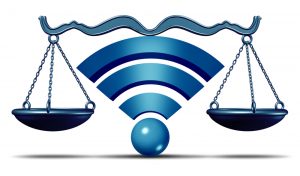
U.S. Reps. Cathy McMorris Rodgers (R-WA) and Greg Walden (R-OR) on Feb. 7 each introduced separate net neutrality bills that would restore rules banning broadband providers from discriminating against lawful content. U.S. Rep. Bob Latta (R-OH) said during the meeting that he plans to propose a net neutrality bill, as well.
Rep. McMorris Rodgers introduced the Promoting Internet Freedom and Innovation Act, H.R. 1096, during the U.S. House Energy and Commerce Subcommittee on Communications and Technology hearing entitled “Preserving an Open Internet for Consumers, Small Businesses, and Free Speech.” Rep. Walden released H.R. 1101.
Network neutrality, most commonly called net neutrality, is the idea that Internet service providers (ISPs) should treat fairly all data that travels over their networks, without discriminating in favor of particular apps, sites or services, according to the Electronic Frontier Foundation (EFF). ISPs, on the other hand, desire to treat each differently so that they can charge for access to a certain site or for a particular service, for instance.
In 2010, the Federal Communications Commission (FCC) released a set of Open Internet rules, which were overturned following a legal challenge in 2014 from Verizon. The FCC tried again in 2015 with new bright line rules set against blocking, throttling and paid prioritization of Internet traffic, and included strict “forbearance” restrictions on what the FCC could do without holding another rulemaking, according to EFF.
However, a newly led FCC in 2017 repealed those rules, which now are being challenged in court, in Congress and by the states, according to EFF. The ISPs have called the FCC’s action a power grab and micromanagement.
Rep. McMorris Rodgers said last week that H.R. 1096, based on a Washington State law, would codify the bright line rules of net neutrality and prevent blocking, throttling and paid prioritization by ISPs.
“The Internet is vital to our future, and the opportunity that it provides is vital to the economic potential of hardworking men and women in the 21st century,” the congresswoman said. “I want to once and for all resolve this manufactured political debate and provide certainty to the internet ecosystem so that we can make that opportunity a reality for every single American.”
H.R. 1096 would amend the Communications Act of 1934 to provide for open internet requirements for providers of broadband internet access service, according to the congressional record summary.
During the subcommittee hearing, McMorris Rodgers said the debate isn’t about the merits of an open, free Internet.
“I support an open, free Internet, and I always have, and my colleagues on both sides of the aisle have as well,” she said. “This is about how we, as Americans, want to shape the future of our economy. Do we want to regulate the internet as a 1930s-style utility, one where burdensome regulation and price controls stifle innovation? An internet that will leave behind rural and poor Americans? Or a 21st century internet that will juice our economy, create jobs, and allow us to be the leader in new cutting-edge technologies like AI, IoT, and autonomous vehicles? An economy that utilizes advances in technology to lift people out of poverty and provide them with more economic opportunities? I – and I hope all of us – want a solution that does the latter… a solution that restores trust and confidence in the American Way.”
H.R. 1096, said McMorris Rodgers, is “a solution that does not institute the changes to the internet that would stop innovation, stifle broadband deployment, and leave millions of Americans behind.”
Meanwhile, Rep. Walden during the subcommittee hearing called on Congress to pass a permanent legislative solution to net neutrality.
“The fact is, since its creation the internet has been the single most important driver of economic growth, job creation, and a better quality of life for all Americans,” Rep. Walden said during Thursday’s hearing. “How we address the future of the internet will impact generations of Americans to come and deserves an open and honest public debate.”
H.R. 1101 also would codify into law permanent prohibitions on blocking, throttling and paid prioritization for internet traffic, while also requiring that ISPs be transparent in their network management practices and prices, according to a statement from the congressman’s office, which added that H.R. 1101 is identical to legislation Rep. Walden introduced in 2015 during the the Obama administration when the FCC imposed restrictions on the internet.
“Republicans and Democrats actually agree on these key parameters of a free and open internet,” Rep. Walden said. “We can agree on a permanent solution to address blocking, as well as throttling, and yes even that untested practice known as paid prioritization.”
Rep. Walden said that the FCC’s 2015 net neutrality rule gave “big government unlimited authority to micromanage every single aspect of a provider’s business, that includes setting rates. There is nothing neutral about this kind of authority.”
The lawmaker added that he thinks the net neutrality debate is about the impact on ISPs that want to close the digital divide.
“Heavy-handed, one-size-fits-all regulations hurt small internet service providers like Eastern Oregon Telecom the most,” he said about one of his home-state ISPs, “and this in turn hurts their ability to expand broadband to underserved communities in rural America.”
H.R. 1101 also would amend the Communications Act to provide that broadband be considered an information service and would prohibit the FCC or a state commission from relying on Section 706 of the Telecommunications Act of 1996 as a grant of authority, according to the text of the bill provided by Rep. Walden.
Both H.R. 1096 and H.R. 1101 have been referred for consideration to the House Energy and Commerce Committee.



